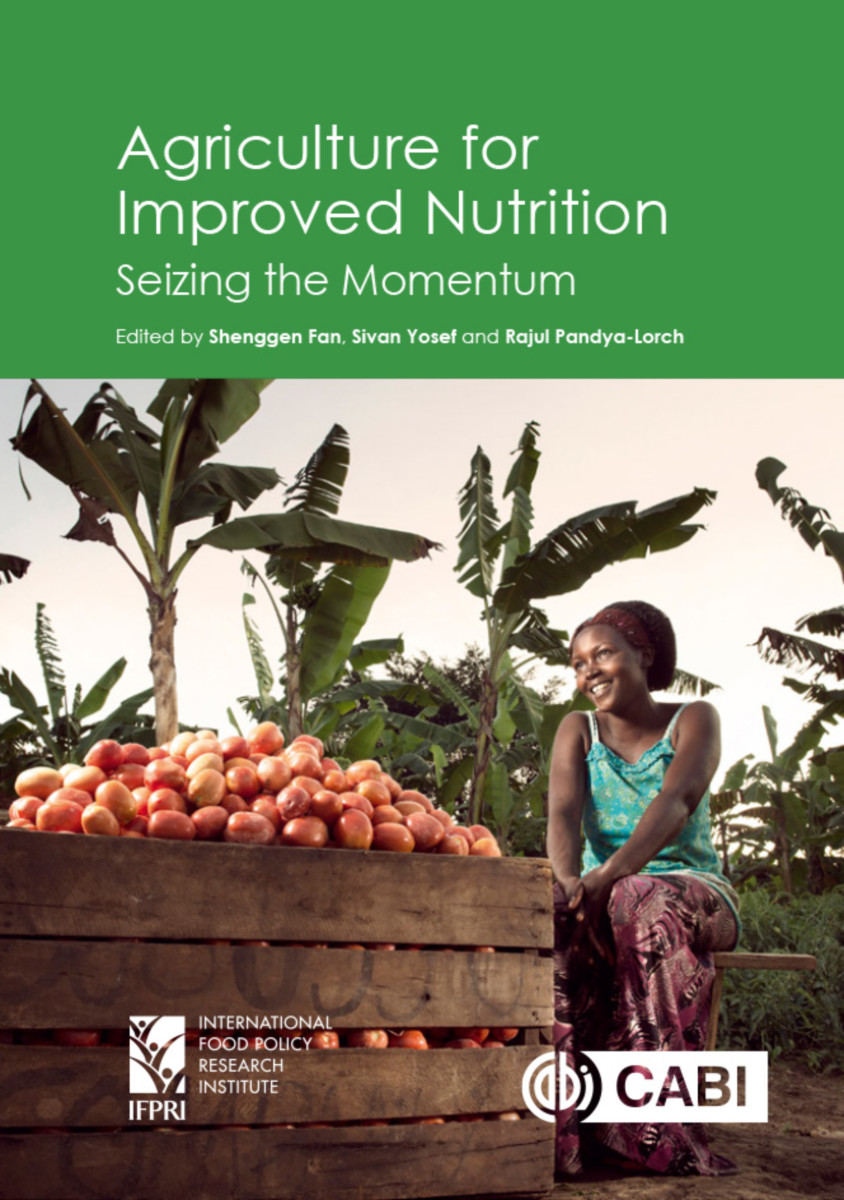Agriculture for Improved Nutrition
Seizing the Momentum
- Publisher
CABI - Published
15th April 2019 - ISBN 9781786399311
- Language English
- Pages 256 pp.
- Size 6.75" x 9.6"
About 800 million people suffer from hunger, 2 billion from lack of micronutrients, and more than 2 billion from overweight and obesity. There is renewed interest in reshaping agricultural and food systems, at the global, regional and national levels, so that poor and vulnerable people have access to and are able to consume nutritious foods.
This book examines direct and indirect effects of agriculture on nutrition, following the agricultural value chain to explore this complex relationship, from biodiversity and crop fortification, to program evaluation, to the impact of agricultural policies on consumers’ choices and actions. It explores the role of various actors along the chain, including women and the private sector, and cross-cutting themes such as data and capacity building. Developing-country experiences and the knowledge and action gaps that remain in truly integrating agriculture and nutrition aims and related practices are considered.
Key Features:
- The evidence base of research on the relationship between agriculture and nutrition is considered
- Includes the insights of some of the world’s top researchers
- Presents data from real-world settings that is highly relevant and timely to developing countries’ current challenges
1: Seizing the Momentum to Reshape Agriculture for Nutrition
2: Agriculture for Nutrition: Direct and Indirect Effects
3: Food Value Chains for Nutrition
4: Biodiversity: An Essential Natural Resource for Improving Diets and Nutrition
5: Improving Nutrition Through Biofortification: A Critical Summary of HarvestPlus-led Research and Implementation Results, 2003 Through 2017
6: Women in Agriculture and the Implications for Nutrition
7: Nutritional Ecology – An Integrated Approach to Addressing Diet, Nutrition and Health Needs in Response to Impacts of Climate/environmental Change on Global Food Systems
8: Reshaping Agriculture to Reduce Obesity
9: New Evidence on Nutrition-sensitive Agricultural Programs: Implications for Program Design, Implementation, and Research
10: Safety Nets for Agriculture and Nutrition
11: How Can Businesses Operating in the Food System Accelerate Improvements in Nutrition?
12: Governance and Leadership in Agri-Food Systems and Nutrition
13: Building Capacity to Link Agriculture and Nutrition
14: Big Data in Agriculture and Nutrition
15: Diversifying Rice-Centric Agriculture and Diets: The Bangladesh Experience
16: Moving Towards Nutrition-sensitive Agriculture Strategies and Programming: Ethiopia Country Case
17: Unraveling India’s Malnutrition Dilemma: A Path Toward Nutrition-sensitive Agriculture
18: From Maize Security to Food and Nutrition Security: The Evolution of Malawi’s Agriculture-nutrition Policy Dialogue
19: Agriculture and Nutrition in China
20: The Way Forward for Nutrition-Driven Agriculture
Shenggen Fan
Shenggen Fan has been director general of the International Food Policy Research Institute (IFPRI) since 2009. Dr. Fan joined IFPRI in 1995 as a research fellow, conducting extensive research on pro-poor development strategies in Africa, Asia, and the Middle East. He led IFPRI's program on public investment before becoming the director of the Institute's Development Strategy and Governance Division in 2005. He is one of the Champions of Target 12.3 of the Sustainable Development Goals, dedicated to inspiring ambition, mobilizing action, and accelerating progress toward cutting global food loss and waste. He serves as a member of the Lead Group for the Scaling Up Nutrition (SUN) Movement appointed by UN Secretary General Ban Ki Moon. He advises many national governments (including China and Vietnam) on agriculture, food security and nutrition. In 2014, Dr. Fan received the World Food Program Hunger Hero Award from the UN Secretary General.
Sivan Yosef
Sivan Yosef is a senior program manager at IFPRI. She joined IFPRI in 2008 and works on special projects through the Director General's Office. These included 2020 Vision Initiative's global policy conferences, including "Leveraging Agriculture for Improving Nutrition and Health" (New Delhi 2011) and "Building Resilience for Food & Nutrition Security (Addis Ababa 2014). Other projects include the IFPRI 2013-2018 Strategy, Global Food Policy Reports, Transform Nutrition, LANSA, and the Knowledge for Implementation and Impact Initiative.
Rajul Pandya-Lorch
Rajul Pandya-Lorch has been chief of staff in the Director General's Office of IFPRI since 2005 and currently also serves as acting director of IFPRI's Communications and Knowledge Management division. From 1998 to 2017, Rajul served as head of IFPRI's 2020 Vision for Food, Agriculture, and the Environment Initiative, a global initiative that seeks to identify solutions for meeting world food needs while reducing poverty and protecting the environment. She has facilitated five major international conferences. Other major projects she has led include "Millions Fed: Proven Successes in Agricultural Development" for which she received the Agricultural and Applied Economics Association (AAEA)'s 2010 Quality of Communication Award. She has also received the American Agricultural Economics Association's 2002 award for Distinguished Policy Contribution.


